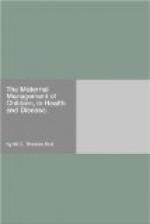In conclusion, I would observe, that I do not think a mother justified in attempting more than what has been laid down here for her guidance. It is believed that the few and plain common-sense directions given, if followed, will do much to prevent disease, and even to relieve it in its milder forms; they will not, however, cure disease itself when really established: and again I would repeat, let the mother recollect that to prevent disease is her province—to cure it, is the physician’s.
Sect. III.—Costiveness.
1. In infancy.
The principle to act upon in the management of the infant’s bowels is this,—that they should be kept free, and by the mildest and least irritating means.
If therefore they become accidentally confined (less than two stools in the four-and-twenty hours), and the infant is suckled, the mother may ascertain whether an aperient taken by herself will render her milk of a sufficiently purgative quality to act upon the bowels of her child. This is the mildest mode of all.
If, however, this does not answer, or is not practicable from the child being fed artificially, then the mildest aperient medicines must be chosen to accomplish this purpose. The kind of medicine to be selected, and the doses in which to be adminstered, will be found in the section on “Aperient Medicine."[FN#39]
[FN#39] See page 97.
If, however, the bowels of the infant are disposed to be habitually confined, it should be ascertained whether this may not be dependent upon its diet. The same food that agrees perfectly well with one child will frequently cause costiveness in another. An intelligent and observing mother will soon discover whether this is the source of the mischief, or not. Boiled milk, for instance, will invariably cause confined bowels in some children; the same result will follow sago boiled in beef tea, with others; whilst, on the other hand, the bowels may frequently be brought into regular order, and their confined state overcome, by changing the food to Leman’s tops and bottoms steeped in hot water, and a small quantity of unboiled milk added; or prepared barley, mixed in warm water and unboiled milk, will have the same effect.




